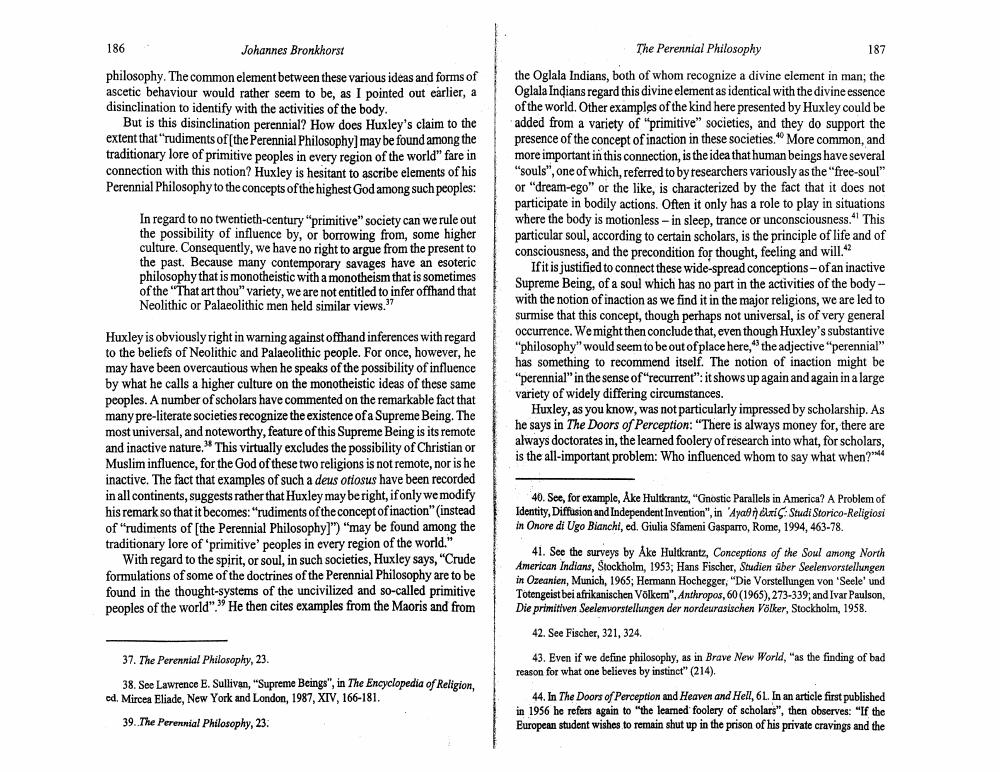Book Title: Perennial Philosophy And Law Of Karma Author(s): Johannes Bronkhorst Publisher: Johannes Bronkhorst View full book textPage 7
________________ 186 - Johannes Bronkhorst The Perennial Philosophy 187 philosophy. The common element between these various ideas and forms of ascetic behaviour would rather seem to be, as I pointed out earlier, a disinclination to identify with the activities of the body. But is this disinclination perennial? How does Huxley's claim to the extent that "rudiments of the Perennial Philosophy) may be found among the traditionary lore of primitive peoples in every region of the world" fare in connection with this notion? Huxley is hesitant to ascribe elements of his Perennial Philosophy to the concepts of the highest God among such peoples: In regard to no twentieth-century "primitive" society can we rule out the possibility of influence by, or borrowing from, some higher culture. Consequently, we have no right to argue from the present to the past. Because many contemporary savages have an esoteric philosophy that is monotheistic with a monotheism that is sometimes of the "That art thou" variety, we are not entitled to infer offhand that Neolithic or Palaeolithic men held similar views.97 the Oglala Indians, both of whom recognize a divine element in man; the Oglala Indians regard this divine element as identical with the divine essence of the world. Other examples of the kind here presented by Huxley could be added from a variety of "primitive” societies, and they do support the presence of the concept of inaction in these societies. More common, and more important in this connection, is the idea that human beings have several "souls", one of which, referred to by researchers variously as the "free-soul" or "dream-ego" or the like, is characterized by the fact that it does not participate in bodily actions. Often it only has a role to play in situations where the body is motionless-in sleep, trance or unconsciousness." This particular soul, according to certain scholars, is the principle of life and of consciousness, and the precondition for thought, feeling and will." If it is justified to connect these wide-spread conceptions-of an inactive Supreme Being, of a soul which has no part in the activities of the body - with the notion of inaction as we find it in the major religions, we are led to surmise that this concept, though perhaps not universal, is of very general occurrence. We might then conclude that, even though Huxley's substantive "philosophy" would seem to be out of place here, the adjective "perennial" has something to recommend itself. The notion of inaction might be "perennial" in the sense of "recurrent": it shows up again and again in a large variety of widely differing circumstances. Huxley, as you know, was not particularly impressed by scholarship. As he says in The Doors of Perception: "There is always money for, there are always doctorates in the learned foolery of research into what, for scholars, is the all-important problem: Who influenced whom to say what when?"4 Huxley is obviously right in warning against ofthand inferences with regard to the beliefs of Neolithic and Palaeolithic people. For once, however, he may have been overcautious when he speaks of the possibility of influence by what he calls a higher culture on the monotheistic ideas of these same peoples. A number of scholars have commented on the remarkable fact that many pre-literate societies recognize the existence of a Supreme Being. The most universal, and noteworthy, feature of this Supreme Being is its remote and inactive nature. This virtually excludes the possibility of Christian or Muslim influence, for the God of these two religions is not remote, nor is he inactive. The fact that examples of such a deus otiosus have been recorded in all continents, suggests rather that Huxley may be right, if only we modify his remark so that it becomes: "rudiments of the concept of inaction" instead of "rudiments of [the Perennial Philosophy]") "may be found among the traditionary lore of 'primitive peoples in every region of the world." With regard to the spirit, or soul, in such societies, Huxley says, "Crude formulations of some of the doctrines of the Perennial Philosophy are to be found in the thought-systems of the uncivilized and so-called primitive peoples of the world". He then cites examples from the Maoris and from 40. See, for example, Ake Hultkrantz, "Gnostic Parallels in America? A Problem of Identity, Diffusion and Independent Invention", in 'Ayandai Studi Storico-Religiosi in Onore di Ugo Bianchi, ed. Giulia Sfameni Gasparro, Rome, 1994, 463-78. 41. See the surveys by Ake Hultkrantz, Conceptions of the Soul among North American Indians, Stockholm, 1953; Hans Fischer, Studien über Seelenvorstellungen in Ozeanien, Munich, 1965; Hermann Hochegger, "Die Vorstellungen von 'Seele und Totengeist bei afrikanischen Völker", Anthropos, 60(1965), 273-339; and Ivar Paulson, Die primitiven Seelenvorstellungen der nordeurasischen Völker, Stockholm, 1958. 42. See Fischer, 321,324. 37. The Perennial Philosophy, 23. 38. See Lawrence E. Sullivan, "Supreme Beings", in The Encyclopedia of Religion, cd. Mircea Eliade, New York and London, 1987, XIV, 166-181. 39. The Perennial Philosophy, 23. 43. Even if we define philosophy, as in Brave New World, was the finding of bad reason for what one believes by instinct" (214). 44. In The Doors of Perception and Heaven and Hell, 6L. In an article first published in 1956 he refers again to "the learned foolery of scholars", then observes: "If the European student wishes to remain shut up in the prison of his private cravings and thePage Navigation
1 ... 5 6 7 8
